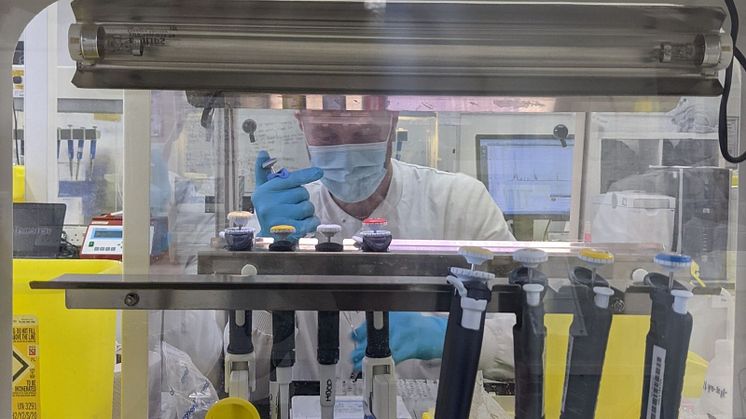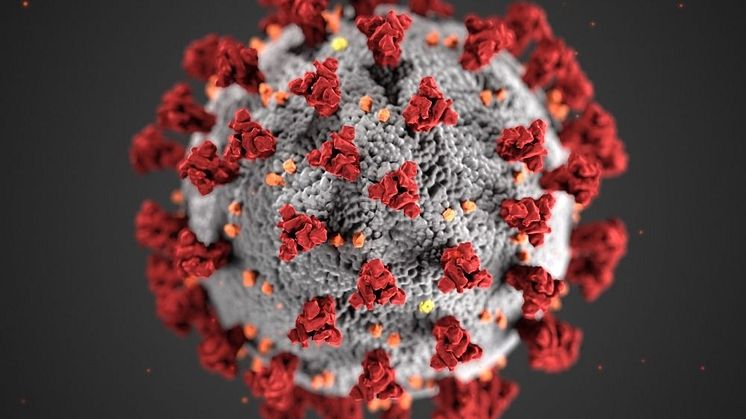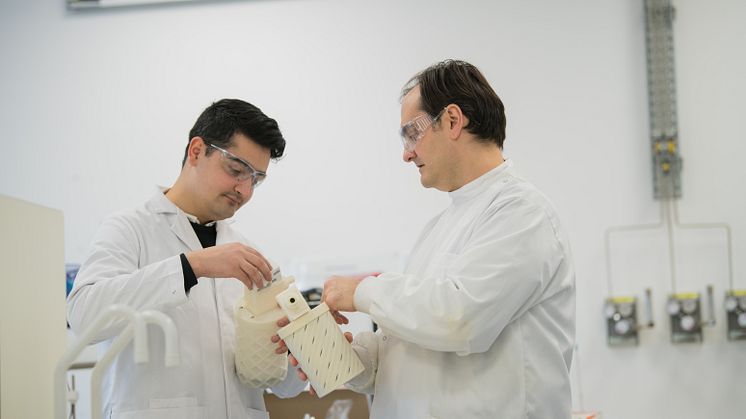
Press release -
Northumbria University joins national genome sequencing alliance to map spread of COVID-19
Scientists at Northumbria University, Newcastle, have joined a research consortium backed by the UK government to help fight COVID-19.
The Government and the UK’s scientific community have backed the UK’s leading clinicians and scientists to map how COVID-19 spreads and evolves using whole-genome sequencing.
Through a £20 million investment, the COVID-19 Genomics UK Consortium (COG-UK) is looking for breakthroughs that could help the UK respond to this, future pandemics, and save lives.
The consortium brings together expert groups across the country to deliver large scale, rapid sequencing of the cause of the disease. Scientists and clinicians are analysing the genetic code of the COVID-19 virus circulating in the UK and in doing so, will give public health agencies, hospitals, regional NHS centres and the Government unique, cutting-edge intelligence to combat the disease.
Led by Professor Sharon Peacock, Director of the National Infection Service, Public Health England, and Chair of Public Health and Microbiology at the University of Cambridge, the group of experts comprises the NHS, Public Health Agencies, Wellcome Sanger Institute and numerous academic institutions – including Northumbria University.
Work to rapidly sequence whole genomes of the COVID-19 viruses is already underway at Northumbria, where a team led by Dr Darren Smith, Associate Professor in Phage Biology, has deployed NU-OMICS, the University’s state-of-the-art DNA sequencing research facility, to assist in the national effort to combat the disease.
Dr Smith, along with Dr Andrew Nelson, Dr Matthew Bashton, Dr Gregory Young and the wider project team are working in partnership with NHS Trusts to enable Northumbria to act as a hub for sample surveillance and outbreak monitoring for the North of England over the next 12 months.
By looking at the entire genome of the virus in confirmed cases of COVID-19 patients, scientists and clinicians can begin to understand is the spread of SARS-CoV-2 and monitor changes within its genome on a regional and national scale.
Dr Smith, Director of NU-OMICS said: “We welcome our addition as the northern England hub for the COG-UK consortium. The power to understand the spread and genome change of SARS-CoV-2 over the timeline of the pandemic is extremely important. This data supports national surveillance but importantly it can be aligned to research questions being asked by the northern NHS Trusts that we hope will support the fight against this novel and devastating virus.”
The consortium network of sequencing centres currently includes Belfast, Birmingham, Cambridge, Cardiff, Edinburgh, Exeter, Glasgow, Liverpool, London, Northumbria, Norwich, Nottingham, Oxford, Portsmouth and Sheffield.
Professor Sharon Peacock, Director of the National Infection Service, Public Health England, said: “This virus is one of the biggest threats our nation has faced in recent times and crucial to helping us fight it is understanding how it is spreading. Harnessing innovative genome technologies will help us tease apart the complex picture of coronavirus spread in the UK, and rapidly evaluate ways to reduce the impact of this disease on our society.”
The COVID-19 Genomics UK Consortium team at Northumbria University includes: Dr Darren Smith, Dr Andrew Nelson, Dr Matthew Bashton, Dr Gregory Young, Dr Josh Loh, Dr John Allan, Dr Mohammed Adnan Tariq (Quadram Institute), Dr Giles Holt (Newcastle University), Professor Gary Black and Dr Lynn Dover.
Notes to editors
Northumbria University
Northumbria University, Newcastle, is a research-rich, business-focused, professional university with a global reputation for academic excellence. Northumbria is one of the largest universities in the UK with more than 30,000 students from over 130 countries.
Northumbria’s NU-OMICS DNA sequencing facility delivers a wide range of genome sequencing projects from Microbiome studies - helping to capture a snap shot of bacterial, fungal and viral communities in clinical and environmental studies, through to genome sequencing of bacteria, virus and fungal species. To find out more and enquire about this service, please visit our NU-OMICS webpage
UK Research and Innovation
UKRI works in partnership with universities, research organisations, businesses, charities, and government to create the best possible environment for research and innovation to flourish. We aim to maximise the contribution of each of our component parts, working individually and collectively. We work with our many partners to benefit everyone through knowledge, talent and ideas. Operating across the whole of the UK with a combined budget of more than £7 billion, UK Research and Innovation brings together the 7 research councils, Innovate UK and Research England.
Public Health England and the COVID-19 Genomics UK Consortium
Public Health England aims to address urgent threats to health in the 21st century. The organisation has been central to the national response to COVID-19, and has led this proposal to develop a national capability to sequence the causative virus and use this to inform public health interventions. The COVID-19 Genomics UK Consortium is led by Sharon Peacock as a collaborative initiative to capture information on the virus and from patients so as to reduce the impact from the COVID-19 epidemic in the UK. The consortium network of sequencing centres currently includes Belfast, Birmingham, Cambridge, Cardiff, Edinburgh, Exeter, Glasgow, Liverpool, London, Northumbria, Norwich, Nottingham, Oxford, Portsmouth and Sheffield.
Additional quotes
Government Chief Scientific Adviser, Sir Patrick Vallance said:
“Genomic sequencing will help us understand COVID-19 and its spread. It can also help guide treatments in the future and see the impact of interventions.
“The UK is one of the world’s leading destinations for genomics research and development, and I am confident that our best minds, working as part of this consortium, will make vital breakthroughs to help us tackle this disease.”
Business Secretary Alok Sharma said:
“At a critical moment in history, this new consortium will bring together the UK’s brightest and best scientists to build our understanding of this pandemic, tackle the disease and ultimately, save lives.
“As a government we are working tirelessly to do all we can to fight COVID-19 to protect as many lives and save as many jobs as possible.”
The UK Consortium, supported by the government, including the NHS, Public Health England, UK Research and Innovation (UKRI), and Wellcome, will enable clinicians and public health teams to rapidly investigate clusters of cases in hospitals, care homes and the community, to understand how the virus is spread and implement appropriate infection control measures.
Professor Sharon Peacock, Director of the National Infection Service, Public Health England, said:
“This virus is one of the biggest threats our nation has faced in recent times and crucial to helping us fight it is understanding how it is spreading. Harnessing innovative genome technologies will help us tease apart the complex picture of coronavirus spread in the UK, and rapidly evaluate ways to reduce the impact of this disease on our society.”
Professor Sir Mike Stratton, Director of the Wellcome Sanger Institute, said:
“In response to the ongoing COVID-19 pandemic, the Sanger Institute will deploy its large-scale sequencing platform alongside regional sequencing centres to support UK Public Health Agencies, regional NHS centres and several Universities to better understand the coronavirus outbreak in the UK.”
“Samples from substantial numbers of confirmed cases of COVID-19 will be whole genome sequenced and, employing the Sanger Institute’s expertise in genomics and surveillance of infectious diseases, our researchers will collaborate with other leading groups across the country to analyse the data generated and work out how coronavirus is spreading in the UK. This will inform national and international strategies to control the pandemic and prevent further spread.”
Sir Jeremy Farrar, Director of Wellcome, said:
“By bringing together public health expertise from Public Health England and genomic science from the Wellcome Sanger Institute the UK can crack the code of this virus, and we should give everyone involved huge credit for that.
“Rapid genome sequencing of COVID-19 will give us unparalleled insights into the spread, distribution and scale of the epidemic in the UK. The power of 21st century science to combat this pandemic is something that those going before us could not have dreamt of, and it is incumbent on us to do everything we can to first understand, and then limit, the impact of COVID-19.”
Professor Fiona Watt, Executive Chair of the Medical Research Council, part of UK Research and Innovation said:
“The UK is a leader in cutting edge genome sequencing science. We are now applying specialist expertise in our fight to slow the spread of coronavirus and accelerate treatments for those affected.
“The ambitious and coordinated response of our research community to the COVID-19 challenge is remarkable.
“This investment and the findings from the consortium will help prepare the UK and the world for future pandemics.”
Topics
Categories
Northumbria is a research-rich, business-focused, professional university with a global reputation for academic excellence. Find out more about us at www.northumbria.ac.uk --- Please contact our Media and Communications team at media.communications@northumbria.ac.uk or call +44 (0)191 227 4604 with any media enquiries or interview requests.













